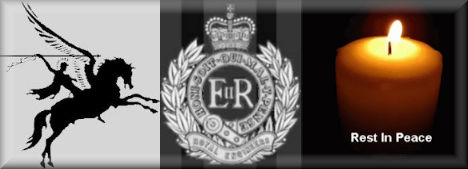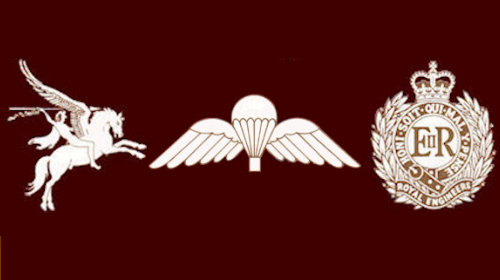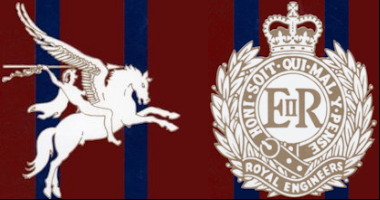
Roll of Honour
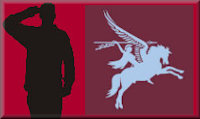
Bob Sullivan December 19th 1922 – May 23rd 2022
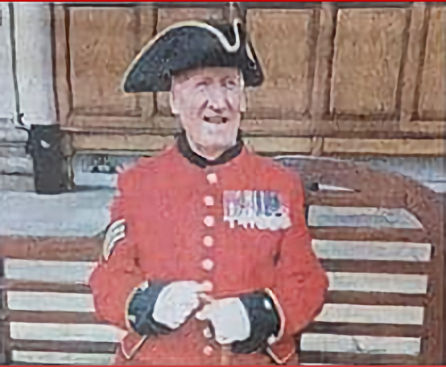 |
Bob Sullivan, who has died aged 99, was parachuted into Normandy on D-Day on a mission to destroy a bridge of great strategic importance; after the war. he had a successful career in industry. Robert James Sullivan was born at North Woolwich in London on December 19th 1922. Always known as Bob, he left school aged 14 and was called up in 1942. He joined the Royal Engineers and, after parachute training, was posted to the 3rd Parachute Squadron RE |
In the early hours of June 6th 1944 Bob, a sapper serving with 3rd Parachute Squadron Royal Engineers, part of 3rd Parachute Brigade, 6th Airborne Division, was dropped into Normandy.
His troop was tasked with destroying the bridge over the river Dives at Robehomme to prevent German armoured attacks on the landing beaches from the east.
Many paratroopers of the division were scattered over a wide area Instead of landing in their planned drop zones, but one sapper and 14 men from B Company 1st Canadian Battalion, who were the supporting force for the sappers, arrived at the bridge within an hour of landing.
The explosives that were needed to blow up the bridge had not arrived so 301b of high explosive was collected from the Gammon bombs that each paratrooper carried. This caused considerable damage to the structure but did not destroy it. At 0600 hours, a much larger party of sappers finally arrived with 2001b of explosive and demolished it.
Bob was so exhausted, having been awake for 36 hours, that he fell asleep in the crater that he had blown at the bridge approach. He was awoken by the sound of gunfire.
As the squadron were about to withdraw from the bridge towards the brigade defensive position at Le Mesnil about three miles away, they came under heavy fire from a German counter-attack. The fields had been flooded by the Germans and the men had to wade down flooded ditches alongside the hedgerows, keeping their heads down until they were out of range of the enemy machine gunners.
To evade the strong enemy presence in the area, they spent the night in the churchyard at Robehomme. There was a danger that they would be fired on by their own troops as they reached their lines so a young officer was sent to Brigade HQ to warn the sentries that the group was trying to return to them.
Moving quietly along country lanes the following night, they were stopped by a German staff car. The occupants took them for Germans and asked for directions. Bob and his group opened fire, dealt with them and moved on.
They reached 3rd Brigade HQ later that night and were ordered to man the frontline slit trenches and relieve men who had been fighting all day.
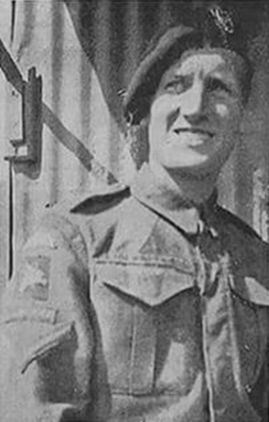 |
Bob in 1943 after parachute training and posting to 3rd Parachute Squadron RE Bob returned to England with 6th Airborne Division in September 1944 to retrain and refit. On Christmas Eve. however, he was ordered to Belgium and took part in the Battle of the Bulge, the campaign to repel the German offensive in the Ardennes. In March 1945, he was dropped with the 6th Airborne Division to support the amphibious assault across the Rhine. During this action, while helping to bring in stragglers who had landed wide of their drop zone, he was targeted by a German mortar unit. Caught in the blast when a bomb dropped close to him. hit in the knee by shrapnel, stunned and unable to walk, he managed To drag himself into cover. He was later found by medics; his wound was dressed and the next day he was evacuated to England. |
In August 1945 he was discharged from hospital and in December he re-joined the 6th Airborne Division, which had deployed to Palestine on internal security duties. He was demobilised the following year in the rank of sergeant.
Bob joined Taylor Woodrow, the house-building and general construction company, and became a director. Major projects in which he took part included Heathrow Airport and Hinkley Point nuclear power station.
In 1983 he was appointed MBE for services to the construction industry.
Two years later, he retired and settled in a village in Hampshire. He regularly attended the annual Normandy commemoration service at Ranville war cemetery. He also travelled extensively on holiday and to visit friends. In 2018 he entered the Royal Hospital Chelsea as a Pensioner.
Bob Sullivan married first, in 1946. Norah Quinlan. She died in 1965. He married secondly, in 1970, Edna Graham, who also predeceased him. He is survived by three sons and a daughter of his first marriage. Another son predeceased him.
